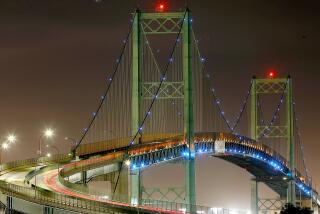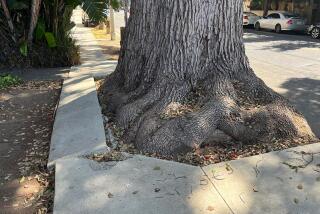Building the Roads to Ruin
- Share via
Traffic congestion is becoming a huge problem in Ventura County. Anyone who regularly travels the Ventura Freeway between Thousand Oaks and Ventura has experienced increasing delays.
In fact, according to a Los Angeles Times article headlined “It’s Slow Going on the 101” (Jan. 23), “The number of cars and trucks traveling the 44-mile stretch of the Ventura Freeway between Los Angeles and Santa Barbara counties has increased 35% at bottlenecks” over the past decade. This increase is more than twice the growth in population and is a warning that a new approach to transportation planning is needed.
What is the response of our elected officials to the increasing gridlock on our freeways? Nothing more than the failed policies and projects that put us in this situation in the first place.
The article quoted above lists a litany of road projects that are supposed to save us from our current congestion woes. Addressing the problems of true bottlenecks, such as the 101/Santa Clara River bridge area, makes sense. However, most of the listed projects will backfire. Instead of reducing congestion, they will encourage the growth and sprawl that are the root causes of congestion.
The state and county seem to be afraid to share their vision of transportation in Ventura County with the public. Perhaps this is because they see no alternative to the Los Angelization of Ventura County. They are doggedly pursuing the piecemeal projects and policies that will result in three parallel freeway arteries through the county.
In their vision California 126 and 118 and the Ventura Freeway will funnel the ever-expanding populations of Los Angeles and the San Fernando Valley into Ventura County. The widening of California 126 has been completed. However, the planned development of Newhall Ranch will immediately clog up that route and another “upgrade” of the 126 will undoubtedly be proposed.
California 118, running through the agricultural Las Posas Valley, is slated for a number of widening and straightening projects to increase the volume and speed of trucks moving cargo from an expanded Port Hueneme.
We contend that this is no vision at all. This is little more than the concrete path paved by Los Angeles and Orange counties before us. Both of these counties are living proof that more freeways and wider roads bring more cars, not mobility.
*
We are part of Transportation Vision 2020 (TV2020), a group formed to address transportation planning issues in Ventura County. TV2020 is asking people to stand up and be heard regarding our transportation future.
We believe it is time for our elected and appointed leadership to reevaluate the transportation policies that are putting us in a state of ever-declining mobility.
We believe it is time to embrace alternatives to ensure that our future in Ventura County doesn’t look like the Ventura Freeway-San Diego Freeway interchange.
We believe that the development of the new California State University Channel Islands campus provides a unique opportunity to improve transit between cities in the county.
Unfortunately, Ventura County is currently squandering money identified specifically for alternative transportation. Responsibility for effective public transit rests with the Ventura County Transportation Commission. VCTC controls the allocation of funds for highway, mass transit, rail, aviation and bicycle projects. Transit funds have been routinely diverted away from identified transit needs with the excuse that all viable public transportation needs have been met.
In fact, in 1997 only 44% of the state funds allocated to the county for transit were actually spent on transit! The 1998-1999 Ventura County Grand Jury found that VCTC has set the standards for unmet transit needs so high that the legitimate requests of the public and cities have been ignored.
Anybody who has waited at a dirty, unsheltered bench for a bus that arrives once an hour knows that the public transit system is far from complete. Almost everybody with the economic and physical means to acquire and drive an automobile quickly decides that they are unwilling to rely on our public transit.
Siphoning of funds away from transit compounds county traffic woes by leaving people with no choice but to drive. At the same time, funding wider roads encourages more development.
How can we build a functional transportation system if elected officials aren’t listening to the public? We hope that VCTC and elected officials seriously consider the identified transit needs and the public comments received in the recent public hearings and act on them.
The citizens of Ventura County spoke when they voted overwhelmingly for the Save Open Space and Agricultural Resources (SOAR) anti-sprawl initiatives. They want county officials to carry out business in a new way.
The county needs to ensure that land-use planning and transportation are linked. We should not wait until traffic congestion strangles mobility and the remainder of our agricultural lands and open spaces are paved over before we begin looking for sustainable and effective solutions to moving goods and people throughout the region.
TV2020 hopes to work with the public and elected officials to ensure effective transportation options for Ventura County. If you are interested in participating in TV2020, please contact us at [email protected].
More to Read
Sign up for Essential California
The most important California stories and recommendations in your inbox every morning.
You may occasionally receive promotional content from the Los Angeles Times.










